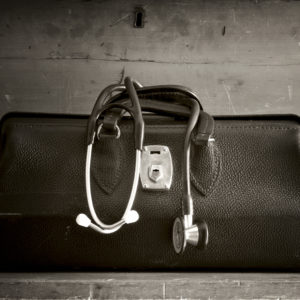The changing economics of medicine made doctors’ house calls obsolete decades ago. Now, using digital technology, a California company called Heal is bringing them back.
A medical patient logs on to Heal’s app, enters an address, credit card number, and symptoms, and a physician shows up at the patient’s home (or elsewhere) within two hours. A Heal visit costs $99 — similar to an out-of-pocket payment for a standard office visit. All PPO and EPO insurers in California now cover Heal visits, so patients pay only the same co-pays they would pay to an ordinary practice.
Heal’s technology is analogous to that of Uber, the ridesharing service. It includes the use of smartphone-, tablet- or laptop-based apps that identify the patient’s address and scans the vicinity for available Heal doctors. Once a doctor is assigned, the patient sees the doctor’s name, photograph, license number and biography. The information on the Heal patient is stored in the app — including a credit card number to cover fees. (Heal patients can request a specific doctor, though that can mean a longer wait.)
For now, Heal operates between 8 a.m. and 8 p.m., giving patients longer hours to choose from than most standard practices offer. A patient doesn’t have to take time off from work to see a doctor. No need to drive to an office, park, drag children around, or find caretakers for them.
Heal visits can reap positive health benefits. Longer hours and greater convenience allow faster treatment of illness. No need to wait days or weeks for an appointment. No exposure to coughing, sneezing patients in a waiting room. Heal doctors aren’t restricted by the office-bound doctor’s time clock, so patients can get longer, more in-depth and more relaxed treatment. The doctors can see how patients live — an important advantage in dealing with long-term medical issues. Blood pressure readings and other metrics can be more accurate in the relaxed environment of the home.
A Heal doctor can provide any medical service that is available for anything a patient may require during a traditional office or urgent care visit. Services include annual physical exams, blood tests, specialist recommendations, flu shots, prescribe medication, family health assessments and so forth. Heal cannot provide emergency room services or surgery, so for those items the patient will have to go the traditional route and visit a doctor’s office or the ER.
Renee Dua, Heal’s chief medical officer, co-founded the company with her husband, Nick Desai, who is CEO. Late one night in 2014 their infant son was ill with a severe cold and needed to see a pediatrician right away. She and Nick waited nearly eight hours in an emergency room — an agonizing experience that led them to create Heal as a solution.
Their confidence in Heal as a business model came not only from their personal experience but also from national statistics. According to Dua, “the average wait time for a primary care doctor appointment exceeds 18 days, and 80 percent of Americans delay or forgo going to the doctor because of lack of time and work responsibilities.” The return of home visits, they felt, would help solve these problems.
There is also an intriguing medical labor market angle — familiar to observers of the larger sharing economy. Heal provides its doctors with flexibility uncommon in a traditional doctor’s office. Some doctors work full-time for Heal; others are moonlighters. A Heal doctor can adjust her work hours to fit her children’s schedules. She can stop taking calls when she is tired or sick or busy. She can take a week off unannounced. And for a doctor with a full-time job elsewhere, Heal offers the opportunity to supplement income whenever time permits.
The high-tech nature of the business makes Heal an attractive investment for outside funders. The company attracted a high-profile group of early investors, including singer Lionel Ritchie.
Ultimately, Heal doesn’t wish to be an evening-and-weekend substitute for other doctors. The company’s goal is to be its patients’ regular primary care provider. Dua is confident that Heal can improve medical outcomes, strengthen patient-doctor relationships and cut medical costs — in part through reduced need for referrals, medications and hospitalizations.

